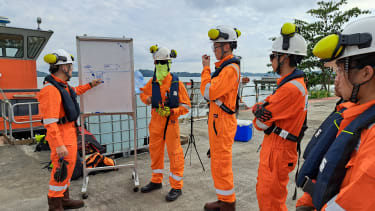-
This course is ideal for professionals involved in oil spill response operations in inland, nearshore, and coastal environments. Designed for Incident Management Teams (IMTs), Emergency Response Teams, and support personnel, it develops your ability to lead and coordinate tactical response operations.
It’s especially suited to:
- On-Scene Commanders overseeing spill response
- IMT and Emergency Response Team members, including safety and logistics roles
- Operational personnel responsible for deploying resources and setting tactical direction
- Environmental and planning staff involved in NEBA or shoreline assessments
- Government representatives and regulatory officials engaged in spill oversight
Now enhanced with a dedicated inland module, the course is particularly valuable for those working near rivers, terminals, ports, or other land-based or nearshore facilities.
-
Delivered in Fort Lauderdale, Florida by OSRL’s experienced bilingual team, this interactive, Spanish-language course equips you with the critical thinking, coordination, and tactical response skills to act effectively during oil spill incidents.
Combining classroom theory with hands-on practical shoreline and inland activities, you'll leave with a solid understanding of key response techniques—ready to operate confidently across multiple environments.
You will gain knowledge and experience in:
- The principles of oil spill preparedness and response strategy
- Understanding how oil behaves in different environments and its impacts
- Implementing effective health and safety measures
- Shoreline and inland response techniques, including booming, berming, damming, and recovery
- Waste management, decontamination, and safe temporary storage
- Applying Net Environmental Benefit Analysis (NEBA) to real-world scenarios
- Engaging with stakeholders and managing media communications during a response
- Using Incident Management System (IMS) / Incident Command System (ICS) for structured coordination and documentation
- Navigating legal considerations around response liabilities and spill termination
-
This one-day module enhances the core On-Scene Commander course with a dedicated focus on inland oil spill response.
Through a realistic, simulated field exercise, delegates will apply tactical response techniques in a controlled inland environment, such as riversides, drainage zones, or intertidal areas. This inland simulation reflects the types of challenges encountered at ports, terminals, pipelines, or nearshore industrial sites.
Topics covered include:
- Site preparation and tactical planning – Learn how to assess an inland site and establish a functional and safe response zone.
- Booming, berming, and damming techniques – Practice surface containment and diversion methods adapted for flowing water or confined terrain.
- Inland assessment and NEBA – Apply Net Environmental Benefit Analysis (NEBA) to select the most effective and least harmful clean-up strategies for inland environments.
Site safety and waste handling – Follow inland safety protocols, including PPE, hazard assessment, and temporary waste storage and removal procedures.
- Inland-specific tools and equipment – Gain hands-on experience using equipment for boom deployment, recovery, and protection during a supervised simulation.
-
Course programme
Structured over five days, the course blends technical instruction with practical response activities—focusing on inland and shoreline environments only.
- Tiered preparedness and OSRL response protocols
- Causes, fate and effects of oil spills
- Environmental and economic impacts
- Site safety, hazard awareness and PPE
- Overview of spill management and IMS/ICS structure and documentation
- Aerial observation of oil on water
- Dispersant use and decision-making (theoretical only)
- Containment and recovery, including in-situ burning
- Shoreline clean-up methods and environmental sensitivity mapping
- Techniques for working on beaches and mangroves
- Practical equipment deployment and safety considerations
- Decontamination and Temporary storage devices, pumps, small boat operation
- Tactical planning for inland incidents
- Inland-specific containment techniques: booming, berming, and damming
- Practical Inland simulated field exercise
- Waste management
- Media engagement and communication strategy
- Demobilisation and termination “End Point”
Participants will also join a guided warehouse tour to familiarise themselves with OSRL’s response equipment and resources.
Course reviews
They covered all the important topics, our time was so well utilised. The trainers were very professional and were extremely supportive with all our questions. The facilities, the team, the content and the staff in general all contributed greatly to our learning experience.
Really good practical exercises, extremely productive. This course has been a very enriching learning experience and it has given me the tools I need to respond to an emergency.
OSRL continues to help our company to stay at the forefront of oil spill response techniques and to teach us how to deliver a quick and effective response to an emergency.
Sessions
- All Locations
- United States
Delegate details are required at checkout. Find out what is needed
Date
Duration
Learning Type
Location
Language
Price From
- $ 3000 pp
- $ 3200 pp

